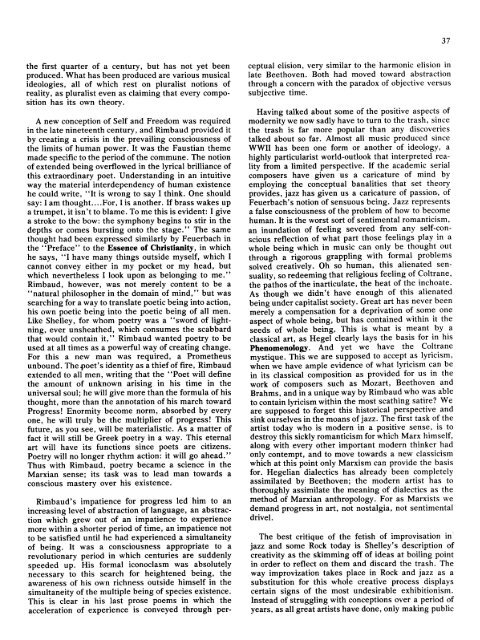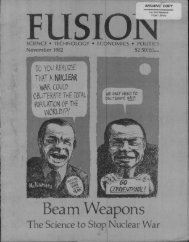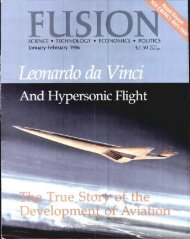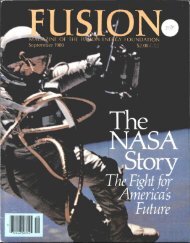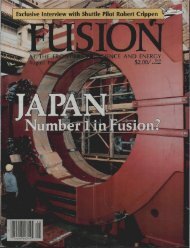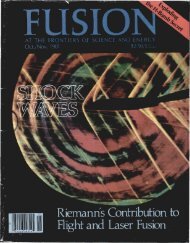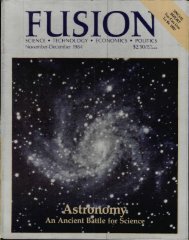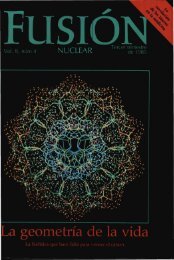New Left, Local Control, and Fascism
New Left, Local Control, and Fascism
New Left, Local Control, and Fascism
Create successful ePaper yourself
Turn your PDF publications into a flip-book with our unique Google optimized e-Paper software.
37<br />
the first quarter of a century, but has not yet been ceptual elision, very similar to the harmonic elision in<br />
produced. What has been produced are various musical late Beethoven. Both had moved toward abstraction<br />
ideologies, all of which rest on pluralist notions of through a concern with the paradox of objective versus<br />
reality, as pluralist even as claiming that every compo- subjective time.<br />
sition has its own theory.<br />
Having talked about some of the positive aspects of<br />
A new conception of Self <strong>and</strong> Freedom was required modernity we now sadly have to turn to the trash, since<br />
in the late nineteenth century, <strong>and</strong> Rimbaud provided it the trash is far more popular than any discoveries<br />
by creating a crisis in the prevailing consciousness of talked about so far. Almost all music produced since<br />
the limits of human power. It was the Faustian theme WWII has been one form or another of ideology, a<br />
made specific to the period of the commune. The notion highly particularist world-outlook that interpreted reaof<br />
extended being overflowed in the lyrical brilliance of lity from a limited perspective. If the academic serial<br />
this extraordinary poet. Underst<strong>and</strong>ing in an intuitive composers have given us a caricature of mind by<br />
way the material interdependency of human existence employing the conceptual banalities that set theory<br />
he could write, "It is wrong to say I think. One should provides, jazz has given us a caricature of passion., of<br />
say: I am thought .... For, I is another. If brass wakes up Feuerbach's notion of sensuous being. Jazz represents<br />
a trumpet, it isn't to blame. To me this is evident: I give a false consciousness of the problem of how to become<br />
a stroke to the bow: the symphony begins to stir in the human. It is the worst sort of sentimental romanticism,<br />
depths or comes bursting onto the stage." The same an inundation of feeling severed from any self-conthought<br />
had been expressed similarly by Feuerbach in scious reflection of what part those feelings play in a<br />
the "Preface" to the Essence of Christianity, in which whole being which in music can only be thought out<br />
he says, "I have many things outside myself, which I through a rigorous grappling with formal problems<br />
cannot convey either in my pocket or my head, but solved creatively. Oh so human, this alienated senwhich<br />
nevertheless I look upon as belonging to me." suality, so redeeming that religious feeling of Coltrane,<br />
Rimbaud, however, was not merely content to be a the pathos of the inarticulate, the heat of the inchoate.<br />
"natural philosopher in the domain of mind," but was As though we didn't have enough of this alienated<br />
searching for a way to translate poetic being into action, being under capitalist society. Great art has never been<br />
his own poetic being into the poetic being of all men. merely a compensation for a deprivation of some one<br />
Like Shelley, for whom poetry was a "sword of light- aspect of whole being, but has contained within it the<br />
ning, ever unsheathed, which consumes the scabbard seeds of whole being, This is what is meant by a<br />
that would contain it," Rimbaud wanted poetry to be classical art, as Hegel clearly lays the basis for in his<br />
used at all times as a powerful way of creating change. Phenomenology. And yet we have the Coltrane<br />
For this a new man was required, a Prometheus mystique. This we are supposed to accept as lyricism,<br />
unbound. The poet's identity as a thief of fire, Rimbaud when we have ample evidence of what lyricism can be<br />
extended to all men, writing that the "Poet will define in its classical composition as provided for us in the<br />
the amount of unknown arising in his time in the work of composers such as Mozart, Beethoven <strong>and</strong><br />
universal soul; he will give more than the formula of his Brahms, <strong>and</strong> in a unique way by Rimbaud who was able<br />
thought, more than the annotation of his march toward to contain lyricism within the most scathing satire? We<br />
Progress! Enormity become norm, absorbed by every are supposed to forget this historical perspective <strong>and</strong><br />
one, he will truly be the multiplier of progress! This sink ourselves in the moans of jazz. The first task of the<br />
future, as you see, will be materialistic. As a matter of artist today who is modern in a positive sense, is to<br />
fact it will still be Greek poetry in a way. This eternal destroy this sickly romanticism for which Marx himself,<br />
art will hav.e its functions since poets are citizens, along with every other important modern thinker had<br />
Poetry will no longer rhythm action: it will go ahead." only contempt, <strong>and</strong> to move towards a new classicism<br />
Thus with Rimbaud, poetry became a science in the which at this point only Marxism can provide the basis<br />
Marxian sense; its task was to lead man towards a for. Hegelian dialectics has already been completely<br />
conscious mastery over his existence, assimilated by Beethoven; the modern artist has to<br />
thoroughly assimilate the meaning of dialectics as the<br />
Rimbaud's impatience for progress led him to an method of Marxian anthropology. For as Marxists we<br />
increasing level of abstraction of language, an abstrac- dem<strong>and</strong> progress in art, not nostalgia, not sentimental<br />
tion which grew out of an impatience to experience drivel.<br />
more within a shorter period of time, an impatience not<br />
to be satisfied until he had experienced a simultaneity The best critique of the fetish of improvisation in'<br />
of being. It was a consciousness appropriate to a jazz <strong>and</strong> some Rock today is Shelley's description of<br />
revolutionary period in which centuries are suddenly creativity as the skimming off of ideas at boiling point<br />
speeded up. His formal iconoclasm was absolutely in order to reflect on them <strong>and</strong> discard the trash. The<br />
necessary to this search for heightened being, the way improvization takes place in Rock <strong>and</strong> jazz as a<br />
awareness of his own richness outside himself in the substitution for this whole creative process displays<br />
simultaneity of the multiple being of species existence, certain signs of the most undesirable exhibitionism.<br />
This is clear in his last prose poems in which the Instead of struggling with conceptions over a period of<br />
acceleration of experience is conveyed through per- years, as all great artists have done, only making public


